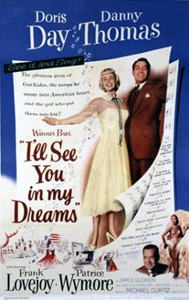I'll See You in My Dreams (1951 film)
| I'll See You in My Dreams | |
|---|---|
 Theatrical release poster | |
| Directed by | Michael Curtiz |
| Written by | Jack Rose Melville Shavelson |
| Based on | The Gus Kahn Story book by Louis F. Edelman Grace Kahn |
| Produced by | Louis F. Edelman |
| Starring | Doris Day Danny Thomas Frank Lovejoy Patrice Wymore James Gleason |
| Cinematography | Ted D. McCord |
| Edited by | Owen Marks |
| Music by | Gus Kahn |
| Distributed by | Warner Bros. |
Release date |
|
Running time | 110 minutes |
| Country | United States |
| Language | English |
| Box office | $2.9 million (US rentals)[1] |
I'll See You in My Dreams is a 1951 musical film directed by Michael Curtiz and starring Doris Day and Danny Thomas.
The film is a biography of lyricist Gus Kahn and includes a number of songs written by him, including the title song. The story, which avoids Kahn's Jewish origins, is told from the point of view of his wife Grace, who was still alive when the film was produced; Kahn had died in 1941.
Insecure Gus Kahn wanders into the musical publishing house where Grace LeBoy is a talent judge of some influence. She challenges him to write a love song, but doesn't expect him to deliver it to her home the same evening. Grace's parents take an instant liking to Gus, even after his borrowed necktie trails into his soup bowl. Grace eventually quits her job to plug Gus' songs on her own. The first song is a hit. But after failed follow ups, Grace turns publicity over to Fred Thompson.
When the great tenor John Mc Cormack makes the songs "Memories" a hit,the tongue-tied Gus finally proposes to Grace.Grace's pregnancy inspires Gus to write another hit,"Pretty Baby". Grace sneak-auditions Gus' songs for producer Sam Harris, gaining Gus entry onto the Broadway stage. It is one hit after another from then on---the one bump being his partnership with Walter Donaldson. Donaldson is an incorrigible playboy and Kahn finds it tough going to adjust to his off-and-on schedule.They eventually break up. Gus suffers serious losses in the Wall Street Crash of 1929, and goes through a long period where he's unable to write. Grace gets him a Hollywood contract---but Gus is outraged at the "charity" and leaves for California alone. His mental block continues--and he suffers a major heart attack.
This brings Donaldson to his side with a promise to be a more reliable partner, and their re- teaming leads to renewed success. At a concluding testimonial dinner, Gus finally says publicly what we've known all along---that Grace is the "brains" of the family and he couldn't have succeeded without her.
I'll See You in My Dreams became Warner Bros.' second-highest-grossing film of 1951. Curtiz teamed with Thomas again the following year for a remake of The Jazz Singer.[2]
Plot
[edit]This article needs an improved plot summary. (March 2013) |
Gus Kahn is a prolific songwriter who meets and falls in love with Grace LeBoy in 1908. His career ascends to spectacular heights with such hits as "Pretty Baby", "My Buddy", "Toot, Toot, Tootsie" and "Makin' Whoopee", but he loses his savings in the 1929 stock-market crash.[3]
Cast
[edit]- Doris Day as Grace LeBoy Kahn
- Danny Thomas as Gus Kahn
- Frank Lovejoy as Walter Donaldson
- Patrice Wymore as Gloria Knight (singing voice dubbed by Bonnie Lou Williams)
- James Gleason as Fred Thompson
- Mary Wickes as Anna
- Julie Oshins as Johnny Martin
- Jim Backus as Sam Harris
- Minna Gombell as Mrs. LeBoy
- Harry Antrim as Mr. LeBoy
- William Forrest as Florenz Ziegfeld, Jr.
- Bunny Lewbel as Irene, at age 6
- Robert Lyden as Donald, at age 8
- Mimi Gibson as Irene, at age 3
- Christopher Olsen as Donald, at age 4 (as Christy Olson)
- Joan Vohs as Chorine (uncredited)
- Hans Conried as William Rossiter(uncredited)
- Dick Simmons as Egbert Van Alstyne (uncredited)
- Tristram Coffin as Maitre'D (uncredited)
- Ray Kellogg as Tenor Singer John Mc Cormack (uncredited)
- Bonnie Lou Williams as Dubbed Singing Voice of Patrice Wymore (uncredited)
Music
[edit]A soundtrack album was released by Columbia Records that contains songs sung by Day (including duets with Thomas) in the film.
The film has been cited by Berry Gordy as an inspiration for his start in songwriting.[4]
References
[edit]- ^ 'Top Box-Office Hits of 1952', Variety, January 7, 1953
- ^ "Articles". Turner Classic Movies. Retrieved November 18, 2022.
- ^ "I'll See You in My Dreams (1951) – Michael Curtiz | Synopsis, Characteristics, Moods, Themes and Related | AllMovie".
- ^ Nelson George, 'Where did our love go', p. 18
External links
[edit]- 1951 films
- 1950s biographical films
- 1951 musical comedy films
- American biographical films
- American musical comedy films
- Biographical films about musicians
- American black-and-white films
- 1950s English-language films
- Films about composers
- Films directed by Michael Curtiz
- Warner Bros. films
- Cultural depictions of classical musicians
- 1950s American films
- English-language musical comedy films
- English-language biographical films
